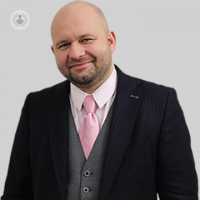Ensuring a complex hysterectomy goes smoothly
Written in association with:A complex hysterectomy, which involves the surgical removal of the uterus, is a significant procedure often performed for various medical conditions such as fibroids or endometriosis.
Given the intricacies of the operation, especially when involving complications like extensive adhesions or previous surgeries, careful planning and expert execution are crucial to ensure a smooth process. Leading consultant gynaecologist Mr Denis Tsepov tells us how both patients and medical teams can work together to achieve the best outcomes.

Preoperative preparation
- Comprehensive medical evaluation: Before a complex hysterectomy, a thorough evaluation of the patient’s medical history, including previous surgeries, underlying conditions and current medications, is essential. This helps in identifying potential risks and planning the surgical approach accordingly.
- Imaging studies: Advanced imaging techniques such as MRI or CT scans may be used to gain detailed insights into the pelvic anatomy. This is particularly important in complex cases where there may be adhesions, large fibroids or other abnormalities that could complicate the surgery.
- Optimising health conditions: Any existing health conditions, such as diabetes or hypertension, should be well-controlled before surgery. Smoking cessation and weight management may also be advised, as these factors can influence both the surgery and recovery process.
- Patient education: Patients should be thoroughly informed about the procedure, including what to expect before, during and after surgery. This includes discussing potential risks, the recovery timeline, and any necessary lifestyle adjustments. Informed patients are often better prepared and less anxious, which can positively impact surgical outcomes.
Intraoperative strategies
- Experienced surgical team: A complex hysterectomy requires a highly skilled surgical team, often including a gynaecologist with experience in complex cases, an anaesthetist and support staff. The team’s expertise is critical in managing any unexpected complications that may arise during surgery.
- Minimally invasive techniques: Where possible, minimally invasive techniques such as laparoscopic or robotic-assisted surgery should be considered. In comparison to traditional open surgery, these approaches lead to less blood loss, reduced postoperative pain and quicker recovery times.
- Precision and care: During the procedure, meticulous attention to detail is necessary to navigate the complexities of the pelvic anatomy. This includes careful dissection around vital structures such as the bladder, ureters, and bowel to prevent injury.
Postoperative care and recovery
- Pain management: Effective pain control is vital in the postoperative period. A combination of medications, including non-opioid options, can help manage pain while minimising side effects. Early mobilisation is encouraged to reduce the risk of complications such as deep vein thrombosis (DVT).
- Monitoring for complications: Close monitoring in the immediate postoperative period is essential to detect any potential complications early, such as bleeding, infection, or urinary problems. This ensures prompt intervention if needed, reducing the risk of more serious issues developing.
- Support and rehabilitation: Recovery from a complex hysterectomy may take several weeks. During this time, patients may benefit from physiotherapy to aid in regaining strength and mobility. Emotional support and counselling can also be important, particularly if the surgery has implications for fertility or body image.
- Follow-up care: Regular follow-up appointments are necessary to monitor recovery progress, manage any ongoing symptoms, and address any concerns the patient may have. Long-term follow-up may be required.
By ensuring thorough preparation, precise surgical execution and diligent postoperative care, the likelihood of a successful outcome from a complex hysterectomy is greatly enhanced. Both patients and healthcare teams play integral roles in this process, working together to achieve the best possible results.
Do you require a complex hysterectomy? Arrange a consultation with Mr Tsepov via his Top Doctors profile.


